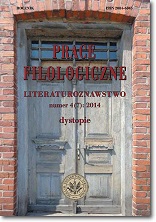Stefana Buszczyńskiego {Rękopis z przyszłego wieku} – granice dystopijnej fantazji w drugiej połowie XIX stulecia
{Manuscript from the coming century} by Stefan Buszczyński – boundaries of dystopian fantasy in the second half of the nineteenth century
Author(s): Damian Włodzimierz MakuchSubject(s): Literary Texts
Published by: Wydział Polonistyki Uniwersytetu Warszawskiego
Keywords: Stefan Buszczyński; dystopia; utopia; fantazja; XIX wiek; Stefan Buszczyński; dystopia; utopia; fantasy; 19thcentury
Summary/Abstract: The author wonders how it is possible that such a catastrophic future was described in 1881 when the era of progress peaked. For this purpose, he defines {Manuscript from the coming century} as a dystopian fantasy (analogous to Frederic Jameson's “desire called utopia”) and analyses the limits of representation as they emerge in a story of the future written by a nineteenth-century author. Firstly, he shows the cultural image of Stefan Buszczyński which presented him as a romantic epigone. Contrary to the stereotypes, he depicts the writer as a researcher who knows the positivism philosophy and the modern statistics. Then, the author demonstrates the limitations of the dystopian form, which contains two irreconcilable concepts of history: voluntarism and determinism. These contradictions are not the only ones. Also the fantasy material is made of four contradictory ideologies, namely, Thomism, Rousseauism, criticism of positivism and capitalism. In conclusion, Buszcyński's thought is shown as a very modern one and the author of {Decline of Europe} could be presented as the founder of the 20th century concepts, whose roots lie obviously in the middle of the 19th century.
Journal: Prace Filologiczne. Literaturoznawstwo [PFLIT]
- Issue Year: 2014
- Issue No: 4 (7)
- Page Range: 159-176
- Page Count: 18
- Language: Polish

